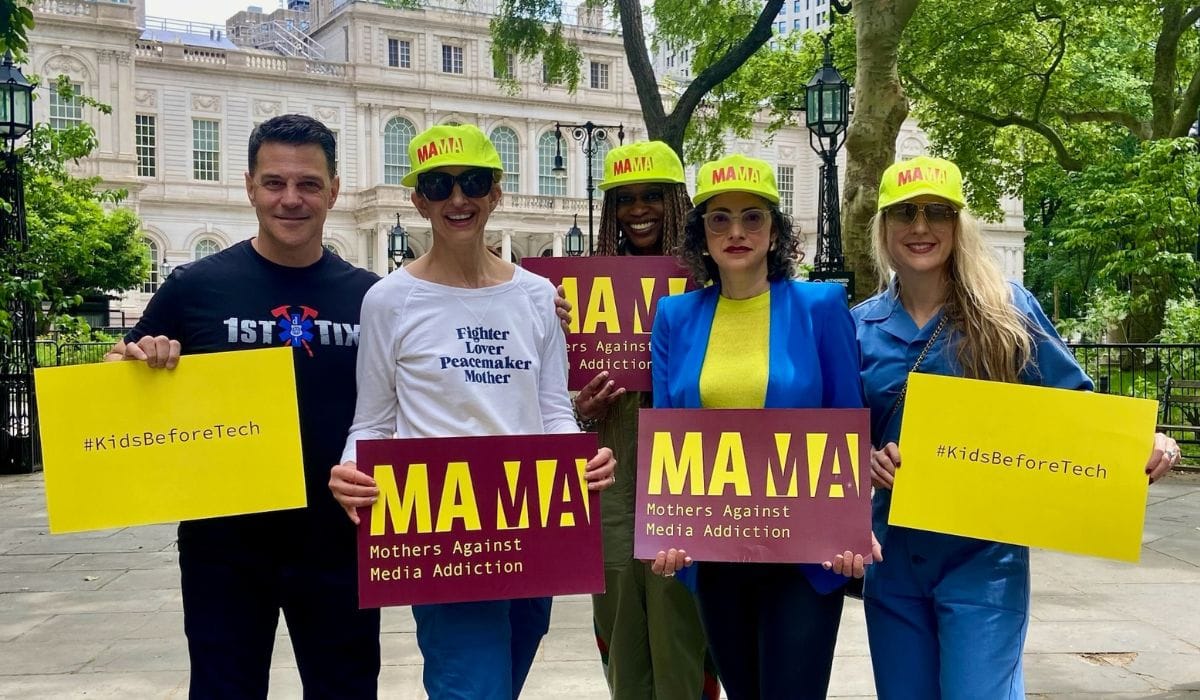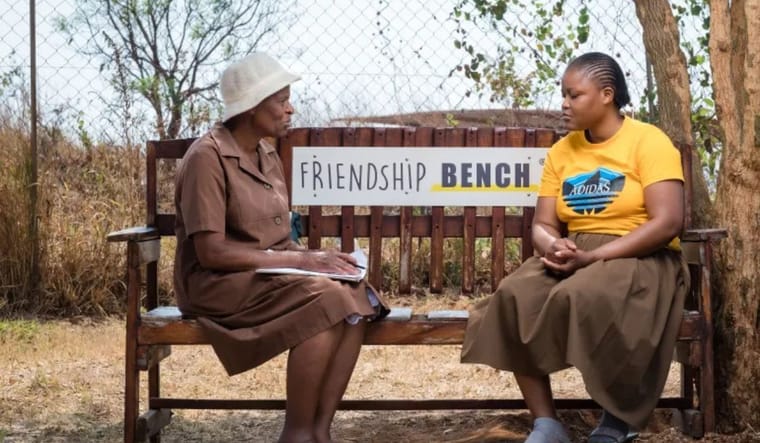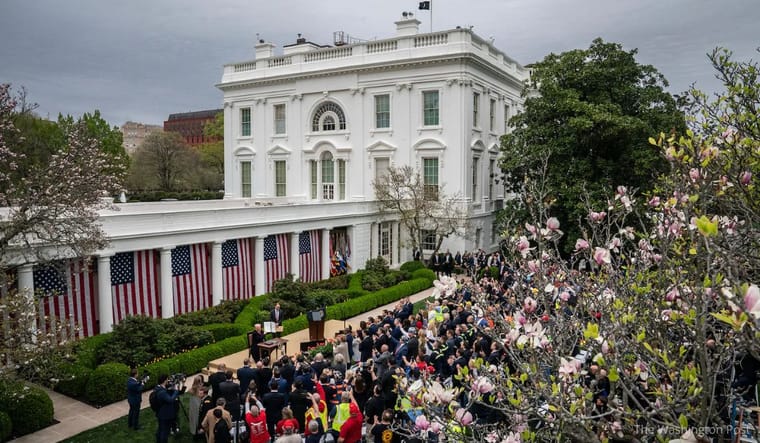Media Addiction Is a Big Problem. Activist Julie Scelfo Founded a Grassroots Movement to Help Parents Fight Back
A few years ago, many parents I knew would have given their kids a smartphone without pause, but not the parents I know today.
They’ve seen too many disturbing headlines about just how dangerous and addictive smartphones are. And if they’ve already given their kid one, they know this firsthand.
As a former New York Times staff writer, I’ve covered a lot of heavy news, including the 9/11 terrorist attacks, but it was a story I wrote ten years ago about a cluster of suicides on college campuses that turned me into an activist.
Social media played a key role in those tragedies, exacerbating the intense pressure young people felt to be perfect. As awareness of the dangers of social media grew, I kept waiting for someone to do something about it. When nobody did, I founded Mothers Against Media Addiction (MAMA), a grassroots movement of parents and allies working furiously to create a world in which real life experiences and interactions remain at the heart of a healthy childhood.
In the ten years since I reported that story, suicide has more than doubled or kids ages 10 to 14, and is now the second leading cause of death for 10 year olds. It’s difficult to understand why until you consider that by the tender age of 8, nearly one in four kids have a personal cell phone. That’s according to a just released report by Common Sense Media—and according to a new Pew Research Center survey, nearly half of teens say they’re online almost constantly. Across all five major platforms (Instagram, Snapchat, TikTok, YouTube, Facebook), one-third of teens use at least one of these sites almost constantly. It doesn’t take a rocket scientist to see the connection between the parallel rise in youth suicide rates and social media use.
Stats like these, and what I saw in my own kids’ lives, terrified me as a mother. Smartphones seemed to surround my three sons wherever we went, even at the pediatrician’s office, on the playground, and in their classrooms. As time went on, the presence of tech in their lives only multiplied, and I knew both from my reporting and my graduate work in media ecology at New York University, where I studied with the great Neil Postman, that no one would be immune to the effects.
A little part of me dislikes when you hear about mothers having to step in to solve a problem for their kids, but the truth is, moms get things done. A mother’s love is fierce, and with that love comes an unwavering conviction to fight like hell to protect our families.
When I founded MAMA, Mothers Against Drunk Driving (MADD) was first to come to mind as a model to follow. Those moms harnessed their grief, anger, and, yes, love to help enact extensive local and national legislation, and they changed public perceptions around drinking and driving. I knew moms could have the same kind of sway over policymakers and the tech industry, and that we could be pivotal in moving the needle away from our society’s blanket adoption of technology, especially when it comes to kids.
MAMA uses a chapter-based structure led by local parent volunteers, just like MADD in its early days. And similar to MADD, we work to change societal norms around addictive behaviors. It’s a lot to take on—even grandparents spend nearly half their time with grandkids on screens—but we need a new normal.
A lot of people are finding us after having read Jonathan Haidt’s book, “The Anxious Generation.” I’m not surprised it’s been on The New York Times’ bestseller list for 48 weeks! It meticulously connects the youth mental health crisis with the ubiquity of social media and smartphones, and every parent I know who has read it is anxious to roll up their sleeves and make a positive change. It’s been exhilarating to welcome so many of them into our movement.
MAMA is 32 chapters strong across 19 states and growing. We have a long waiting list of parents eager to start new chapters, and new members signing up every day. It’s a hopeful time, but there’s a lot of work ahead.
Our three-part mission is to teach parents how to keep kids safe online; to help schools adopt bell-to-bell phone-free school policies; and to demand laws that protect children from the harms of unregulated tech.
I see getting phones out of the classroom as the most impactful change we can make right now. They’re gadgets that make teaching more difficult but cheating and bullying easier. It’s time for them to be expelled from our schools.
Everyone knows the compulsion to check a phone during the school day inhibits kids’ development, distracts them from learning, and limits their in-person interactions with peers. And we know from school safety experts that they don’t keep kids any safer in the rare event of a school shooting.
There’s bipartisan consensus on this, which is refreshing. Governors Sarah Huckabee Sanders and Kathy Hochul both reached out for MAMA’s help in passing phone-free legislation in their states—and, of course, we had plenty of moms at the ready.
Our chapter leaders all over the country are attending school board and town hall meetings to advocate for bell-to-bell policies, and then they’re working closely with their school communities to develop and implement them. They’re meeting with lawmakers to push for more comprehensive protections both in their states and at the federal level. They’re educating their communities about social media harms and providing resources to those who need them. In New York, where MAMA launched, chapter leaders recently participated in the statewide Disconnected conference, hosted by New York State United Teachers union.
These are busy moms (and dads and aunts and uncles and grandparents) who are volunteering their time and effort because they know how crucial it is to return schools to the phone-free spaces our kids need to focus, learn, socialize, and thrive.
It’s hard to believe, but today’s youth spend nearly nine hours a day on screens. Tech companies design it that way. The more our kids scroll, the richer these executives get. And so our precious children are ruthlessly targeted by addictive algorithms designed to exploit their immaturity, innocence, and emotional vulnerability for profit. Suicide is the most devastating consequence of this but the truth is that everyone is affected on some level, and even an effect as seemingly minor as a declining attention span has huge real-world consequences for kids.
I’m proud to see mothers at the forefront of the effort to fight back, demanding the cultural and regulatory changes kids need to feel safer, happier, and more connected in their homes, schools, and communities. We’re choosing to become flip-phone families. We’re drawing up House Rules and sticking to them. We’re learning from experts and talking about media literacy to our kids. We’re putting our phones down so that we’re experienced as present, attentive parents.
Most importantly, we’re acknowledging that we’re in this mess together and that, together, we can and must find our way out.
Mothers’ collective voices are rising, and you can bet that we will be heard.
Julie Scelfo is an award-winning journalist, a former New York Times staff writer, a media ecologist, and a parent. She is the founder of Mothers Against Media Addiction (MAMA), a grassroots movement of parents fighting back against media addiction and creating a world in which real-life experiences and interactions remain at the heart of a healthy childhood.
Please note that we may receive affiliate commissions from the sales of linked products.



